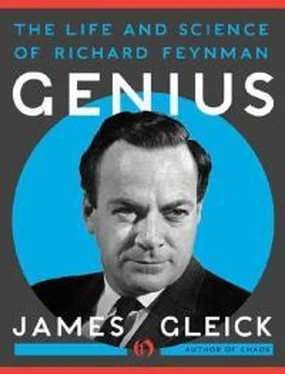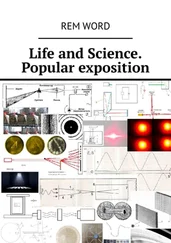“real,” possibly as real as any other theoretical structure invented to describe nature.
Once again Feynman had placed himself at the center of modern theoretical physics. His language, his framework, dominated high-energy physicists’ discourse for several years. He wanted to move on again, or so he told himself.
“I’m a little bit frustrated,” he said to a historian soon after he published his first parton paper.
I’m tired of thinking of the same thing. I need to think of something else. Because I got stuck—see, if it would keep going it would be al right, but it’s hard to get any new results… . This parton thing has been so successful that I have become fashionable. I have to
find an unfashionable thing to do.
Feynman routinely refused to recommend col eagues for the Nobel Prize, but he broke his rule in 1977—after Gel -
Mann had already won the prize once—and quietly nominated Gel -Mann and Zweig for their invention of quarks.
Teaching the Young
RICHARD. [ Humming softly to himself ] Jee-jee-jee-ju-ju.
Jee-jee-jee-ju-ju. [ He is working. Dishes are being cleared from the breakfast table. A tape recorder makes a faint whirr as it eavesdrops: a friend has taken to leaving it running in hopes of capturing stories about Feynman’s past. ] Jee-jee-jee-ju-ju.
[ Stops abruptly. ] There’s some fool has made a mistake here. Some damn fool made a mistake here.
MICHELLE. Prob’ly you.
RICHARD. Me? What do you mean, me? [ Pause. ] Some idiot has made an error. [ Sings ] I have an idiot here who made an error.
MICHELLE. Yeah—you!
RICHARD. Michel e, dear, be careful what you say. After al your father is a nice fel ow and he doesn’t want that kind of trouble. [ Pause. ] He’s made a mis-too-
ko. You know, mistookos happen. You know. You don’t want your daddy to be a bad boy. [ Drums a sharp tattoo with his fingers. ] That is of course wrong! As any fool can see.
It took years for Feynman’s children to realize that their father was not like other fathers. He seemed normal y distracted, lounging in his dog-chewed recliner or lying on the floor, writing on notepads, humming to himself in flights of concentration that were hard to break through. He doted on them and told them fantastical y imaginative stories. In one ongoing saga they became tiny inhabitants of a gigantic household world; Feynman would describe the forest of brown leafless trees rising around them, for example, until suddenly they would guess that those were the fibers of the carpet. Or he would hold them on his lap and say, “What do you know about? You know about concrete and you know about rubber and you know about glass …” He taught them what he considered the basics of economics: that when prices go up, people buy less; that manufacturers set prices to maximize profits; that economists know very little. There were times when they thought he had been placed on earth mainly to embarrass them in public—pretending to beat them about the head with a newspaper or talking to waiters in his mock Italian.
He was always what Michel e thought of as borderline boisterous, singing and whistling to himself. He would make up rhymes under his breath as he walked around the house—“I’m going to pick up my shoe, that’s what I’m going
to do”—and when chal enged he would be unable to repeat what he had just said. Belatedly it dawned on them that not al their friends could look up their fathers in the encyclopedia. His own mother was stil alive, and he seemed to revert to a child in her presence. Lucil e would say, “Richard, I’m cold—would you please put on a sweater?” When Omni magazine cal ed him the world’s smartest man, she remarked, “If that’s the world’s smartest man, God help us.”
Carl showed an early gift for science, to Feynman’s immense delight. When he was twelve, Feynman showed him an odd-looking photograph he had brought home from a Canadian laboratory and Carl guessed—correctly—that it was “probably a diffraction pattern from a laser from a regular pattern of square holes,” and Feynman could not help boasting to a friend, “I could have kil ed him—I was afraid to ask him for the focal length of the lens used!” He tried not to prod too clumsily, and he told himself that he would be happy with any careers his children chose (“trumpet
playing—social
worker—zygophalatelist—or
whatever,” he wrote Carl), as long as they were happy and good at what they did. When Carl reached col ege, however—MIT—he found the one career ambition guaranteed to break his father’s equilibrium. “Wel ,”
Feynman wrote, “after much effort at understanding I have gradual y begun to accept your decision to become a philosopher.” But he hadn’t. He felt as betrayed and put upon as a business executive whose child wants to be a poet.
I find myself asking, “How can you be a good philosopher?” I see now that, like the poet son who never thinks of money (because he expects his old man to pay) you have chosen philosophy, over clear thought (and so your old man goes on with his clear thoughts) so that you can fly above common sense to far higher and more beautiful aspects of the intel ect.
“Wel ,” he added sarcastical y, “it must be wonderful to be able to do that.” Educating his children made him think again about the elements of teaching and about the lessons his own father had taught. By the time Carl was four, Feynman was actively lobbying against a first-grade science book proposed for California schools. It began with pictures of a mechanical wind-up dog, a real dog, and a motorcycle, and for each the same question: “What makes it move?” The proposed answer—“Energy makes it move”—enraged him.
That was tautology, he argued—empty definition.
Feynman, having made a career of understanding the deep abstractions of energy , said it would be better to begin a science course by taking apart a toy dog, revealing the cleverness of the gears and ratchets. To tel a first-grader that “energy makes it move” would be no more helpful, he said, than saying “God makes it move” or “moveability makes it move.” He proposed a simple test for whether one is teaching ideas or mere definitions:
You say, “Without using the new word which you have just learned, try to rephrase what you have just learned in your own language. Without using the word energy , tel me what you know now about the dog’s motion.”
Other standard explanations were just as hol ow: gravity makes it fall , or friction makes it wear out . Having tried to impart fundamental knowledge to Caltech freshmen, he also believed it was possible to teach real knowledge to first-graders. “Shoe leather wears out because it rubs against the sidewalk and the little notches and bumps on the sidewalk grab pieces and pul them off.” That is knowledge. “To simply say, ‘It is because of friction,’ is sad, because it’s not science.”
Feynman taught thirty-four formal courses during his Caltech career, roughly one a year. Most were graduate seminars cal ed Advanced Quantum Mechanics or Topics in Theoretical Physics. That often meant his current research interest: graduate students sometimes heard, without realizing it, the first and last report of substantial work that another physicist would have published. For almost two decades he also taught a course, listed in no catalog, known as Physics X: one afternoon a week, undergraduates would gather to pose any scientific question they wished, and Feynman would improvise. His effect on these students was immense; they often left the Lauritsen Laboratory basement feeling that they had had a private pipeline to an oracle with an earthy kind of
Читать дальше












